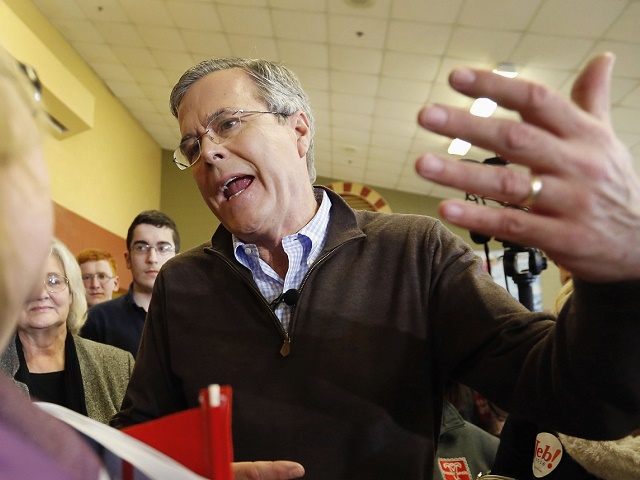Jeb Bush appears to be positioning himself for an Alamo-like stand in the Lone Star State’s March Republican Primary Election. Despite a massive TV ad buy, it is highly unlikely the man who is brother of the former Texas governor turned president and the son of another Texan who became president will succeed.
Why? Texas is conservative – Jeb isn’t.
Jeb Bush has reserved $5 million for an ad buy and organizational costs to blitz the Texas television markets with what could be 10,000 television ads, the San Antonio Express-News reported.
“Texas will be a major factor if this race shifts beyond the first four,” said Bush supporter and fund raising bundler Jay Zeidman from Houston. “There’s so many delegates that I think Texas becomes your ground zero, and I think that’s when you’ll really see the Bush network come out to support the governor.”
However, if you look at the results of the Texas 2014 statewide primary and general election, things do not look good for a candidate with Jeb’s record and issue positions. Conservative and tea party candidates cleaned up in the 2014 Republican primary. Moderate Republicans and people who were connected to moderate leaders were soundly defeated.
In the 2014 Texas general election, Republicans running on the statewide ballot ran on conservative positions like securing the border, opposing amnesty, and opposing federal education programs like Common Core. These are all issues where Bush appears weak in the eyes of Texas voters who soundly elected conservatives like Greg Abbott, Dan Patrick and Ken Paxton. The Texas House and Senate also both became more conservative during that election cycle.
Texas has 155 delegates that will be distributed to Republican candidates. The rules this year for delegate assignments are very complicated. The San Antonio Express-News reported the process as follows:
Organization will be important because the 155 Texas delegates will be distributed among candidates on a so-called graduated proportional basis. Most delegates will be awarded by congressional district, with three up for grabs in each of the 36 districts. Others will be awarded statewide. A candidate has to get at least 20 percent of the vote to get any delegates. If a candidate gets more than 50 percent, he or she will earn all the delegates allotted to that geographic area.
Sounding optimistic, Paul Lindsay with the pro-Bush super-PAC Right to Rise told the San Antonio news outlet, “We’ve always been prepared for the long haul, and states like Texas that are among the March 1 states are really the beginning of what will be a long primary process. Jeb’s connections to Texas and his unmatched record of conservative reform among his rivals in the race will make him very competitive in the state.”
Bush; however keeps stumbling on issues Texans care about. In addition to his positions on immigration reform, border security and education that seem at odds with the positions of people elected by the voters of Texas, Bush seems to just stumble on things. For instance, Bush recently told a group of Florida Republicans there were no homeless veterans in Houston, according to the Houston Chronicle.
“Can I make another point? I want to tout something,” Bush told the crowd. “Three months ago I was in Houston, Texas, and a guy who I met woke up one day and he said, ‘I do not want to see a homeless veteran on the streets of Houston.’ He’s a successful guy – he had the resources to draw people towards this cause.”
“And in Houston, Texas, today, there are no homeless veterans,” Bush said. “They didn’t wait for a federal government to create a program. They didn’t wait for Washington to do anything. They said, ‘This is the definition of who we are.'”
What happened in Houston, the Houston Chronicle reported, was the federal government did enact a program in 2009 to end veteran homelessness by 2015. The City of Houston did not begin its participation in the program until 2012. The first three years of that effort did significantly reduce the numbers of homeless veterans, but it came no where close to ending it. From 2012 to January 2015, the last numbers available, the homeless veteran population in Houston fell by half to 563 homeless veterans.
Politifact’s Emma Hinchliffe rated Bush’s comments about no homeless veterans as “Mostly False.”
A recent trial poll run by the University of Texas and the Texas Tribune revealed that Jeb Bush only has four percent support. Bush was also picked at people’s second choice by four percent of the voters. Perhaps more troubling for Bush, nearly a quarter of Texas Republicans said they definitely would not vote for the former Florida governor.
“The only thing that Jeb could hope for is to amass some reasonable number of delegates here without actually winning the state, but the fact is there are a lot of people competing for those delegates and people who have looked stronger than him,” said Joshua Blank. He serves as manager of polling and research for the Texas Politics Project that conducted the poll.
Voters in Texas are very aware of who Jeb Bush is and what he represents. When asked if he should change some of those things in New Hampshire last week, the Houston Chronicle reported Bush’s answer as, “I’m not going to change who I am. I’m not.”
Bob Price serves as associate editor and senior political news contributor for Breitbart Texas and is a member of the original Breitbart Texas team. Follow him on Twitter @BobPriceBBTX.

COMMENTS
Please let us know if you're having issues with commenting.